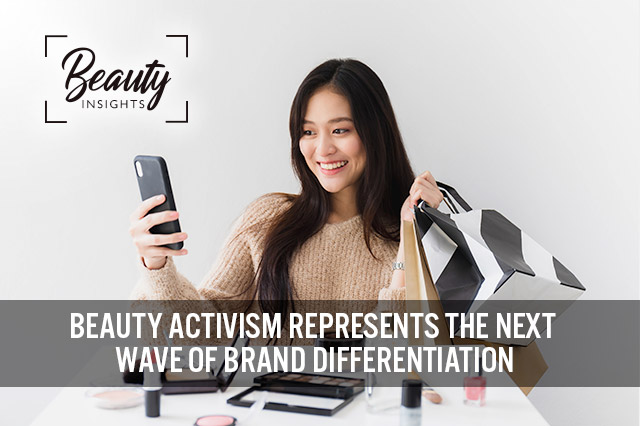
DIpil Das
Our Beauty Insights series explores prominent or emerging themes and trends in the global beauty market. In this report, we look at how beauty brands are taking stands on political, social and environmental issues through “beauty activism,” which involves efforts to promote causes, educate consumers and make social changes through action.
Beauty Companies Respond to the Coronavirus through Social Activism
The beauty sector (and the retail industry overall) has seen a marked increase in activist initiatives by brands and retailers since the coronavirus global pandemic began in January 2020. Seeing a brand take positive action and do good deeds in times of need helps consumers to feel connected to the brand, which is likely to have a halo effect on sales.
 Source: ELLE Indonesia’s Instagram account [/caption]
Beauty Activism Is the Next Beauty Movement
Previously, beauty brands and companies achieved product differentiation by incorporating clean, natural, organic ingredients. However, with consumer expectations continuously rising, natural beauty products are becoming a standard rather than an exception. Today, clean beauty is just one element that consumers are demanding: The industry is entering a new era in which components of the entire lifecycle of beauty products—from ingredients to packaging—are receiving attention from consumers. Environmental initiatives such as sustainability and zero-waste are now gaining traction, and activism is emerging as a way for brands to positively promote themselves by aligning with consumer values.
For example, out of the 13 brands selected for Sephora’s Accelerate 2020 Cohort, two selected “give back” as part of their business proposition.
Source: ELLE Indonesia’s Instagram account [/caption]
Beauty Activism Is the Next Beauty Movement
Previously, beauty brands and companies achieved product differentiation by incorporating clean, natural, organic ingredients. However, with consumer expectations continuously rising, natural beauty products are becoming a standard rather than an exception. Today, clean beauty is just one element that consumers are demanding: The industry is entering a new era in which components of the entire lifecycle of beauty products—from ingredients to packaging—are receiving attention from consumers. Environmental initiatives such as sustainability and zero-waste are now gaining traction, and activism is emerging as a way for brands to positively promote themselves by aligning with consumer values.
For example, out of the 13 brands selected for Sephora’s Accelerate 2020 Cohort, two selected “give back” as part of their business proposition.
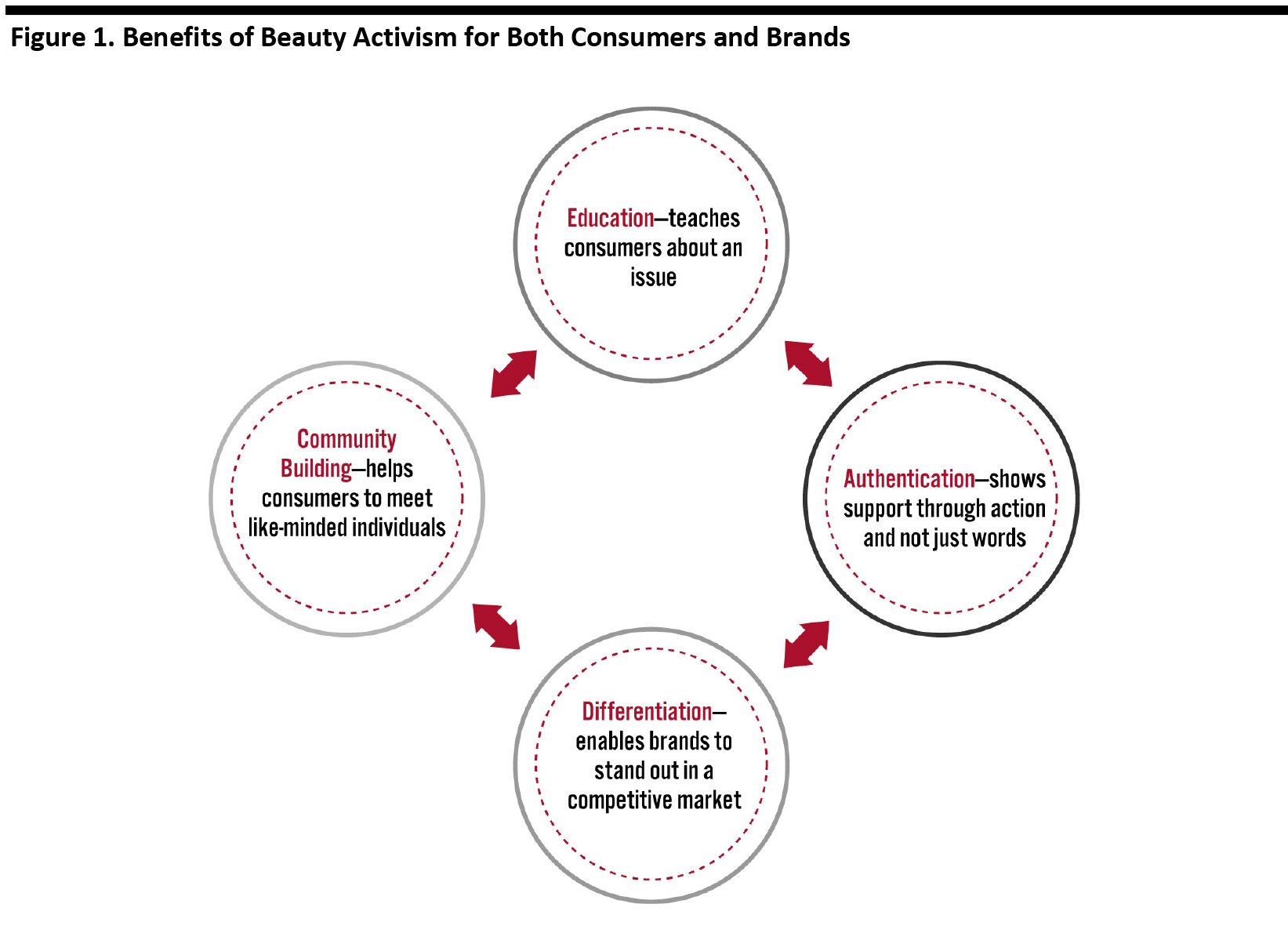 Source: Coresight Research[/caption]
Education: Activism helps to educate consumers around topics. As simple as it sounds, beauty companies and brands are using activism as a way to educate consumers around a particular issue or topic to which it is aligned.
Source: Coresight Research[/caption]
Education: Activism helps to educate consumers around topics. As simple as it sounds, beauty companies and brands are using activism as a way to educate consumers around a particular issue or topic to which it is aligned.
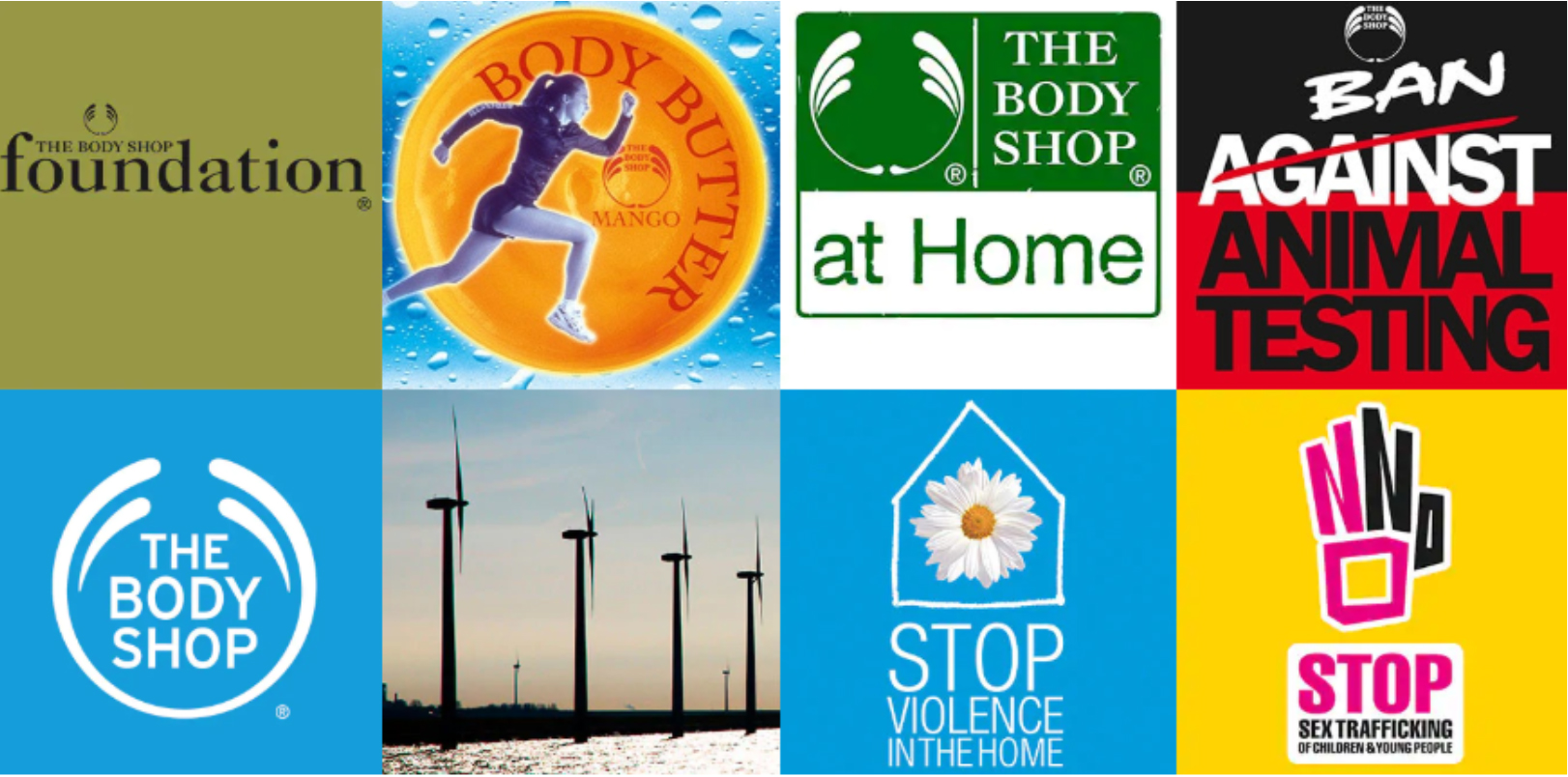 The Body Shop educates consumers on initiatives that it supports
The Body Shop educates consumers on initiatives that it supports
Source: TheBodyShop.com [/caption] Authentication: Activism supports words through action. By not just being “all talk,” beauty retailers and brands are stepping up for causes they believe in. This is an important distinction in an era of greenwashing, where companies give misleading information about how their products or ingredients are environmentally friendly.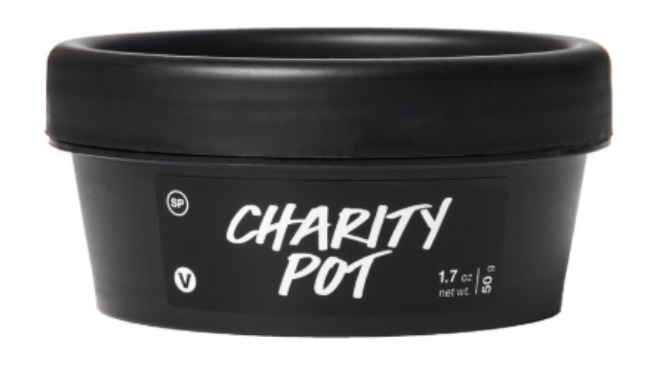 Source: Lush.com[/caption]
Community Building: Events help consumers to meet other like-minded consumers. Activism efforts help to build communities among consumers. Events enable like-minded individuals to connect with each other and work towards a common goal or campaign. This also provides retailers with targeted marketing opportunities.
Source: Lush.com[/caption]
Community Building: Events help consumers to meet other like-minded consumers. Activism efforts help to build communities among consumers. Events enable like-minded individuals to connect with each other and work towards a common goal or campaign. This also provides retailers with targeted marketing opportunities.
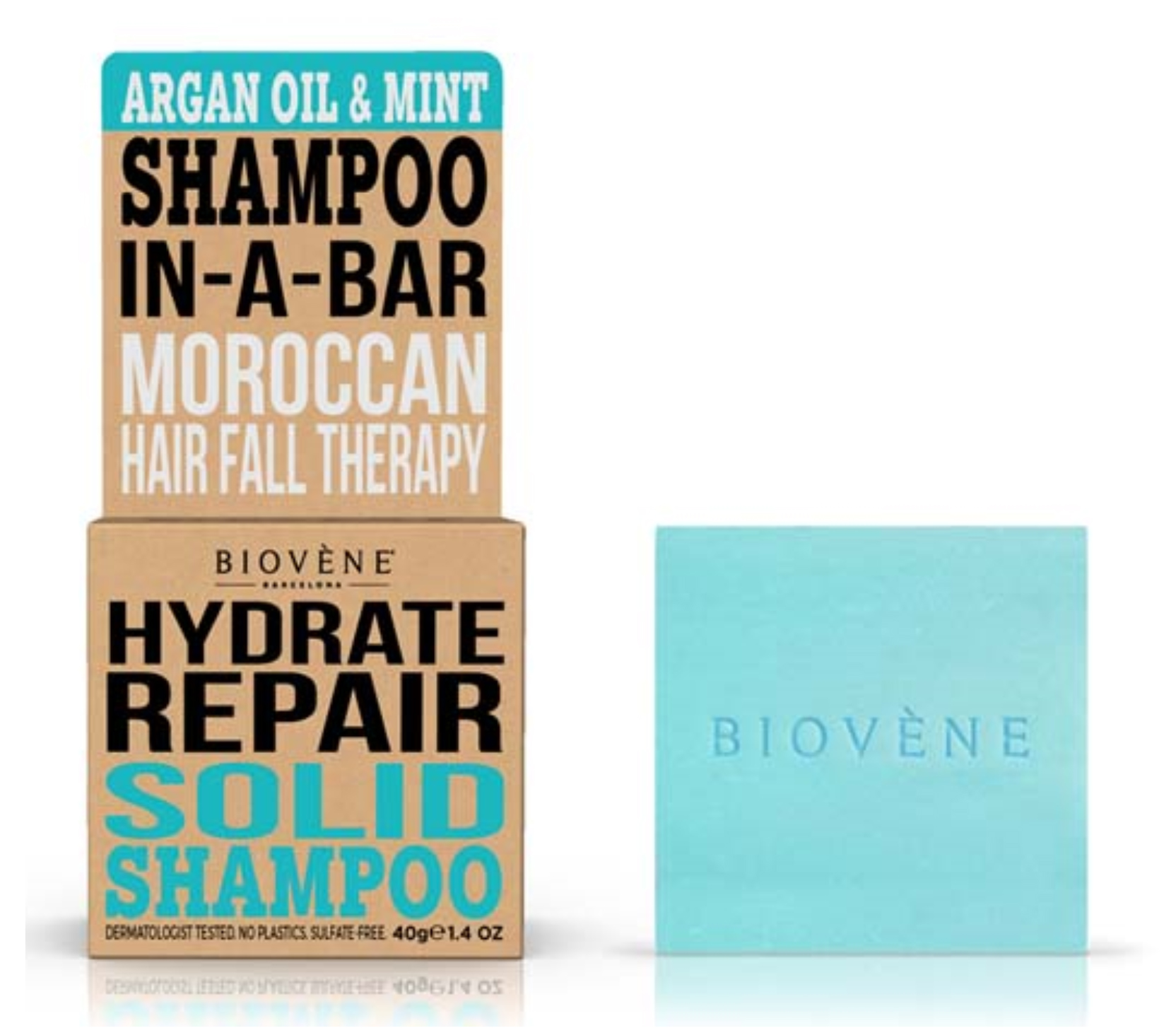 Source: Biovène[/caption]
Differentiation: Activism can be that “one extra element” that helps to set brands apart.
Activism helps to differentiate a brand among its competitors in a crowded beauty market. As mentioned previously, clean or organic ingredients set brands apart in the past, but that is no longer enough as it has become the norm: Brands must now look to match and beat new consumer expectations around social values and change.
Source: Biovène[/caption]
Differentiation: Activism can be that “one extra element” that helps to set brands apart.
Activism helps to differentiate a brand among its competitors in a crowded beauty market. As mentioned previously, clean or organic ingredients set brands apart in the past, but that is no longer enough as it has become the norm: Brands must now look to match and beat new consumer expectations around social values and change.
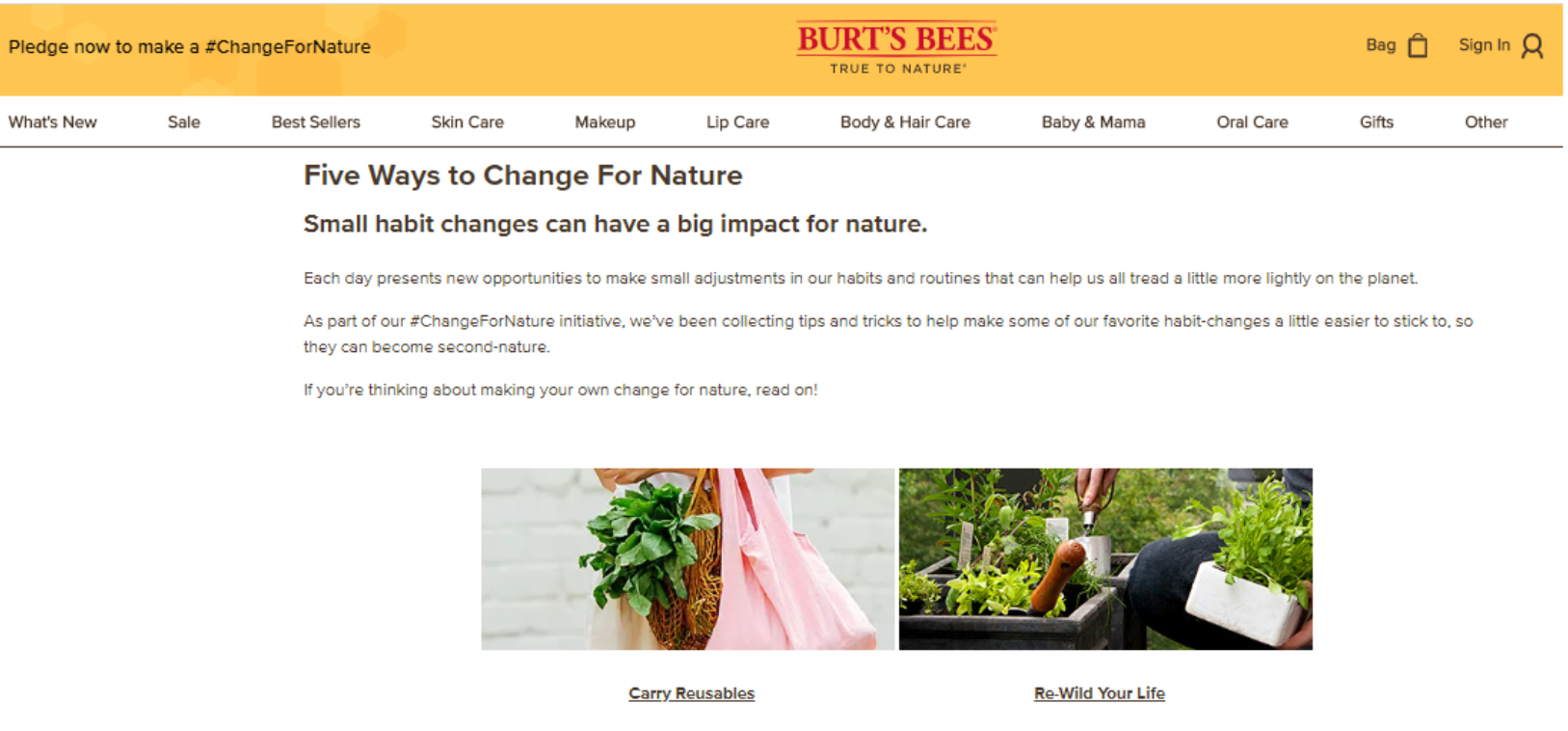 Source: Burtsbees.com[/caption]
Source: Burtsbees.com[/caption]
- Global beauty company Coty announced that it will start to manufacture and supply emergency services with hand sanitizer in response to the coronavirus pandemic.
- On March 18, 2020, global beauty company L'Oréal announced plans to donate €1 million ($1.1 million) to partner associations to “support the disadvantaged.” In addition, according to Women’s Wear Daily, L'Oréal is using its facilities to produce hand sanitizer and hydroalcoholic gel.
- Luxury beauty company LVMH (Louis Vuitton Moet Hennessey) transitioned its factories from perfumeries into manufacturing plants for hand sanitizer, in order to meet a request for help from the French government during the coronavirus. On March 15, 2020, LVMH CEO Bernard Arnault instructed the production facilities of the company’s perfume and cosmetic brands—Guerlain, Parfums Christian Dior and Parfums Givenchy—to produce large quantities of hand-sanitizing gel as a priority, which would be distributed free of charge to the French authorities. Through this commitment, LVMH intends to help minimize the risk of product shortages in France and enable a greater number of people to protect themselves from the spread of the virus. LVMH began deliveries to the French health authorities within four days of launching production of hand sanitizer, the company has been posting about its progress on social media, using the hashtag #LVMHjoinsforces.
 Source: ELLE Indonesia’s Instagram account [/caption]
Beauty Activism Is the Next Beauty Movement
Previously, beauty brands and companies achieved product differentiation by incorporating clean, natural, organic ingredients. However, with consumer expectations continuously rising, natural beauty products are becoming a standard rather than an exception. Today, clean beauty is just one element that consumers are demanding: The industry is entering a new era in which components of the entire lifecycle of beauty products—from ingredients to packaging—are receiving attention from consumers. Environmental initiatives such as sustainability and zero-waste are now gaining traction, and activism is emerging as a way for brands to positively promote themselves by aligning with consumer values.
For example, out of the 13 brands selected for Sephora’s Accelerate 2020 Cohort, two selected “give back” as part of their business proposition.
Source: ELLE Indonesia’s Instagram account [/caption]
Beauty Activism Is the Next Beauty Movement
Previously, beauty brands and companies achieved product differentiation by incorporating clean, natural, organic ingredients. However, with consumer expectations continuously rising, natural beauty products are becoming a standard rather than an exception. Today, clean beauty is just one element that consumers are demanding: The industry is entering a new era in which components of the entire lifecycle of beauty products—from ingredients to packaging—are receiving attention from consumers. Environmental initiatives such as sustainability and zero-waste are now gaining traction, and activism is emerging as a way for brands to positively promote themselves by aligning with consumer values.
For example, out of the 13 brands selected for Sephora’s Accelerate 2020 Cohort, two selected “give back” as part of their business proposition.
- Mawena’s organic skincare line has a 100% Mayan Women’s cooperative in Mexico and donates a percentage of proceeds for each product sold.
- Sobrebarba, a beard care company from Brazil, donates a percentage of its profits to reforestation projects in the Amazon rainforest.
 Source: Coresight Research[/caption]
Education: Activism helps to educate consumers around topics. As simple as it sounds, beauty companies and brands are using activism as a way to educate consumers around a particular issue or topic to which it is aligned.
Source: Coresight Research[/caption]
Education: Activism helps to educate consumers around topics. As simple as it sounds, beauty companies and brands are using activism as a way to educate consumers around a particular issue or topic to which it is aligned.
- The Body Shop, a subsidiary of Brazilian company Natura & Co, is known for its activism roots, which it has pioneered since the 1970s. The Body Shop reopened its Canadian flagship store in August 2019 after a period of renovation, and the store is dedicated to the company’s mission of environmental sustainability and gender equality. It features the Activism Corner, where consumers can learn about how they can get involved and “take a stand with The Body Shop’s global and local collective of fearless activists,” according to the company. In an effort to be green, The Body Shop has launched a refill program that minimizes plastic waste, through which consumers can refill aluminum bottles with shower gel, available in five scents.
 The Body Shop educates consumers on initiatives that it supports
The Body Shop educates consumers on initiatives that it supports Source: TheBodyShop.com [/caption] Authentication: Activism supports words through action. By not just being “all talk,” beauty retailers and brands are stepping up for causes they believe in. This is an important distinction in an era of greenwashing, where companies give misleading information about how their products or ingredients are environmentally friendly.
- As discussed above, Coty, L’Oréal and LVMH are responding to the coronavirus pandemic by manufacturing hand sanitizer in their production facilities. This authenticates the companies’ compassion; they are showing that they care about social issues through their actions.
 Source: Lush.com[/caption]
Community Building: Events help consumers to meet other like-minded consumers. Activism efforts help to build communities among consumers. Events enable like-minded individuals to connect with each other and work towards a common goal or campaign. This also provides retailers with targeted marketing opportunities.
Source: Lush.com[/caption]
Community Building: Events help consumers to meet other like-minded consumers. Activism efforts help to build communities among consumers. Events enable like-minded individuals to connect with each other and work towards a common goal or campaign. This also provides retailers with targeted marketing opportunities.
- Haircare brand Biovène supports cleanbeachinitiative.org, a global charity that works to raise awareness of environmental issues and organizes local beach cleanups in Spain. Biovène launched its “In-A-Bar” haircare products as part of its #ReplaceTheBottle campaign; the line of shampoos and conditioners are made in eco-friendly packaging without plastic. The company’s aim is to build a community of consumers that support environmental activities and global change.
 Source: Biovène[/caption]
Differentiation: Activism can be that “one extra element” that helps to set brands apart.
Activism helps to differentiate a brand among its competitors in a crowded beauty market. As mentioned previously, clean or organic ingredients set brands apart in the past, but that is no longer enough as it has become the norm: Brands must now look to match and beat new consumer expectations around social values and change.
Source: Biovène[/caption]
Differentiation: Activism can be that “one extra element” that helps to set brands apart.
Activism helps to differentiate a brand among its competitors in a crowded beauty market. As mentioned previously, clean or organic ingredients set brands apart in the past, but that is no longer enough as it has become the norm: Brands must now look to match and beat new consumer expectations around social values and change.
- Burt’s Bees is differentiating itself with its social activism campaign #changefornature, through which it is challenging consumers to make changes that can impact nature and post about them on social media, specifically Instagram. The environmentally friendly brand offers tips on its blog, including carrying reusables and cutting food waste, as well as encouraging consumers to “re-wild” their lives by engaging more with the outdoors.
 Source: Burtsbees.com[/caption]
Source: Burtsbees.com[/caption]